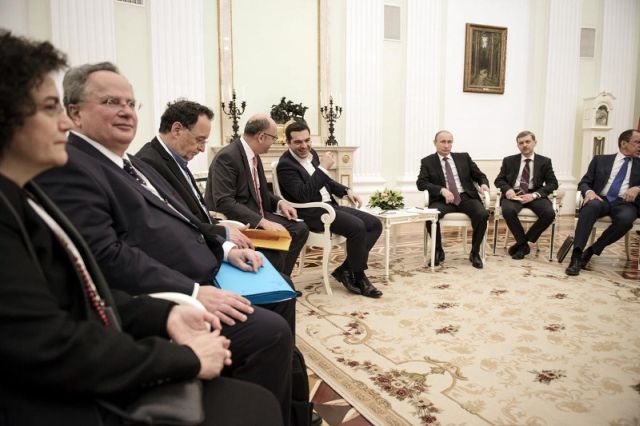Photo: Andrea Bonetti/SOOC/POOL
A publication by the Greek newspaper To Vima reveals that Alexis Tsipras had requested Moscow to lend Greece $10 billion to start printing a new currency.
As stated in the publication that refers to the words of the Prime Minister in his latest interview with the state television ERT, he was "aware that the introduction of the national currency would not be possible without the availability of a considerable amount of currency in Greece," continuing, "Therefore, he had requested Moscow to lend $10 billion to use them to support the drachma."
According to the newspaper To Vima, "Moscow had not rejected the request but vaguely started to consider a loan of $5 billion as a "down payment" for the South Stream pipeline. Simultaneously, there had been loan requests to Iran and China but none of the two countries had succumbed to temptation because they had no benefit from being involved in a blow against the euro zone."
The same publication claims that "the model of Slovakia’s separation from the Czechoslovak Republic in early 1993 and the introduction of the Slovak koruna was one example of currency changing studied by certain technocrats inside and outside the Ministry of Finance."
The report signed by Pavlos Papadopoulos and entitled "Leonid, Alexis and Panagiotis" and subtitled "The former KGB agent, the flirt with SYRIZA, the trips to Moscow and the loan that had never been granted" describes in detail unknown scenes from recent months and the rapprochement of the Greek government with Moscow.

Enthusiasm of the novice
"There was an abundance of bright smiles under the influence of "the enthusiasm of the novice" and no one suspected the firmness of international relations. Securitization of future revenues from the exploitation of hydrocarbons in the Aegean Sea took an important place in the arsenal of the Greek side, which would increase the currency resource of the new drachma. Perhaps that was why Germany, which followed with growing anger ... the international diplomacy of Athens, had actually "confiscated" the future hydrocarbons by automatically including them in the new Fund for state property sale."
Who were aware of the Prime Minister’s plans
The publication in the newspaper To Vima indicates, "Since the beginning of 2014 Tsipras had planned to bet on Moscow to prepare a solid and credible plan to return to the drachma," stressing that "Panos Kammenos, Yiannis Dragasakis, Yanis Varoufakis, Nikos Pappas, Panagiotis Lafazanis and other government members were aware of the Prime Minister’s plans."
The report also recalls that during a trip to Moscow, Alexis Tsipras had condemned the European policy in Ukraine and supported the holding of a referendum in the eastern regions that wanted to separate.
"They thought that as soon as the Germans realized that Athens was determined to "crack" the euro zone they would succumb to the Greek request for considerable debt forgiveness. Thus, Tsipras would have somehow changed Europe, as he himself believed. The Greek Prime Minister had confidently followed this path over the past year and until a few days ago, which was why he had rejected many of the agreement proposals that were much more favourable than the last. But he wanted the most ..."
The article also reveals that Nikos Kotzias had undertaken the "geopolitical matchmaking" between Alexis Tsipras and influential Russians such as Leonid Reshetnikov shortly before the European elections, while the crisis in Ukraine was in full swing. "The professor really proved to be useful, thus securing himself the post of foreign minister."
The role of the KGB agent

The publication also notes that Leonid Reshetnikov, the 68-year-old head of the Russian Institute for Strategic Studies played an important role in the contacts between Athens and Moscow. He speaks Greek and is one of the most influential and wise advisors to Vladimir Putin on foreign policy. He was an agent of the KGB and later worked at the International Intelligence Service. "The Russian Kissinger" is a close friend of Vladimir Putin and originally founded the Institute as part of the Russian secret services. Since 2009, by decision of the Russian President and with the major funding from the Ministry of Foreign Affairs, he has had the ambition to turn it into the Russian response to the Western RAND and Stratfor.
Putin’s sardonic smile
Tsipras visited Russia twice in the first five months of his governance. The second time was in St. Petersburg on Friday, 19 June, when he told Putin, "We are maritime people who are not afraid to sail the high seas as well as new seas to reach new and more secure ports." While the Russian head of state was listening to him, a sardonic smile appeared on his the face for a short while. As confirmed by reliable sources, when Tsipras travelled to Moscow he had already taken the decision on the referendum, although he had been warned about the impending closure of banks (and not only by Mario Draghi).